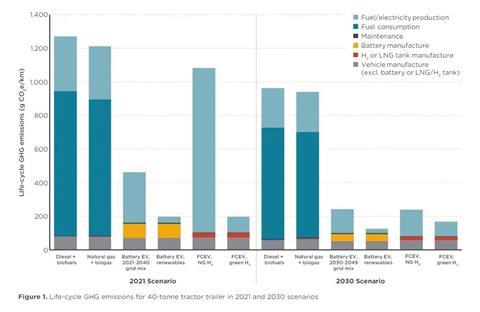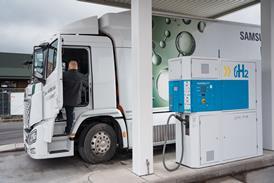A new study released by the International Council on Clean Transportation, a Washington-based environmental think tank, comparing lifetime greenhouse gas emissions for different fuel types, claims battery electric vehicles are best; gas-powered trucks are marginal in the GHG emission benefits compared to diesel and the fuel usage of the vehicle is more important than its manufacture for the life of the truck.

The report, released as part of a contribution to the European Commission’s review of CO2 targets to accelerate the decarbonisation transition, uses a life-cycle assessment to analyse different powertrain options across a range of measures comparing the emissions attributable to fuel production and consumption as well as the vehicle’s manufacturer and production. The report compared the 2021 model year truck types covering battery electric, hydrogen fuel cell, natural gas and diesel power supply.
According to the results battery electric trucks produce at least 63% lower lifetime emissions compared to diesel. This reduction is already possible using today’s EU electrical grid, says the report, which is not 100% renewable. The high energy efficiency of the electric powertrains shrinks their carbon footprint, making them a cleaner option even if the source of electricity is not fully clean. As the grid continues to decarbonise, the emissions of these battery-electric vehicles will continue to fall. Projections show up to a 92% reduction ofemissions when 100% renewable electricity is used, the report finds. Fuel cell electric trucks running on hydrogen produced from fossil fuels reduce GHG emissions by 15 to 33% compared to diesel. This is reduced by up to 89% if hydrogen is produced by renewable electricity.
The report is less complimentary about the impact of natural gas-powered trucks. While it concedes natural gas trucks may reduce emissions by 4% to 18% compared to their diesel counterparts, the impact of methane slip is a significant concern and when accounting for the near-term global warming potential for methane, the lifetime climate impact is worse than diesel.
The reports also concludes, the biggest portion of lifecycle GHG emissions produced by trucks over their lifetime corresponds to the fuel consumption phase, not to the vehicle manufacturing. For diesel and natural gas trucks, the consumed fuel accounts for over 90% of their lifetime emissions. As a result the higher vehicle and battery production emissions of battery electric trucks are offset by their high efficiency and low lifetime fuel cycle emissions.
Supporting documents
Click link to download and view these filesLifecycle-assessment-trucks-and-buses-emissions-Europe - Copy
PDF, FileSizeText 1.17 mb














No comments yet